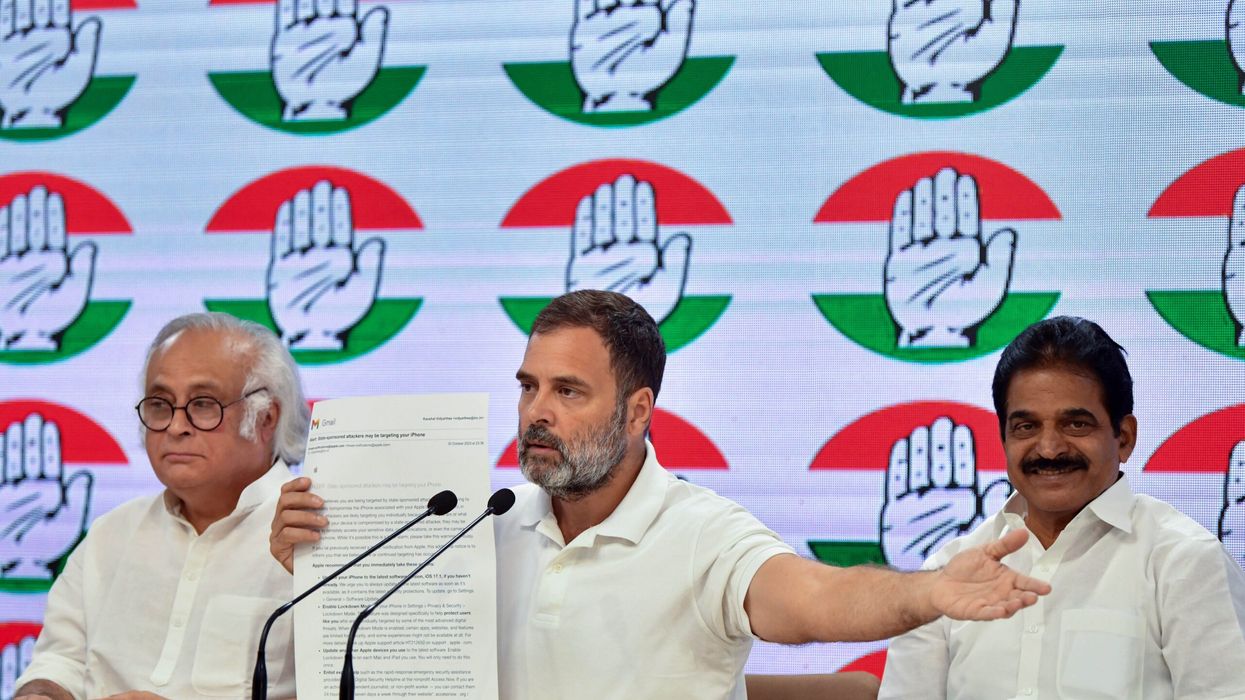India's main opposition Congress party said on Friday its bank accounts with Rs 2.1 billion (£20 million) in deposits had been frozen by the income tax department in connection with a dispute, just months before general elections.
The party called the action "a deep assault on India's democracy", adding that an income tax tribunal had however allowed the party to partially operate its accounts until February 21, when it would hear the case.
Congress treasurer Ajay Maken told reporters the party had filed a complaint against the tax department after it told banks to freeze funds in its accounts.
"We got information two days back that cheques being issued by us were not being honoured by banks... We don't have money to pay electricity bills, to pay salaries to our employees," Maken said.
Maken said the Rs 2.1 billion frozen by the tax department was collected by the party through crowd-funding and membership drives, adding that the dispute with the tax department was in connection with an issue dating back to 2018-19.
He said the action against the party was aimed at sidelining it ahead of the polls.
"When the principal opposition party's accounts have been frozen just two weeks before the announcement of the national elections, do you think democracy is alive in our country?" he asked reporters.
"Don't you think it is going towards a one-party system?"
"Today is a sad day for Indian democracy," he said, adding that the party was appealing the decision in court and would stage public protests.
The income tax department did not respond to calls and messages seeking comment.
The tax department's action comes just weeks before dates for a general election, which has to be conducted by May, are to be announced.
Congress, once India's most dominant party, has sunk to historic lows in parliament and in many states after Prime Minister Narendra Modi swept to power in 2014.
"Power drunk Modi Govt has frozen the accounts of the country’s largest Opposition party," Congress president Mallikarjun Kharge posted on X. "We appeal to the Judiciary to save the multi-party system in this country and protect India's Democracy."
Earlier, Congress party leader Rahul Gandhi was convicted of criminal libel last year after a complaint by a member of Modi's party.
His two-year prison sentence saw him disqualified from parliament for a time until the verdict was suspended by a higher court, but raised concerns over democratic norms in the world's most populous country.
Congress is a member of an opposition alliance hoping to challenge Modi at this year's polls, and other leading figures in the bloc have also found themselves under investigation.
Arvind Kejriwal, leader of the Aam Aadmi Party and chief minister of the capital region Delhi, has repeatedly been summoned by investigators probing alleged corruption in the allocation of liquor licences.
Earlier this month police arrested Hemant Soren, until then the chief minister of eastern Jharkhand state and another leading figure in the opposition alliance, for allegedly facilitating an illegal land sale.
India's main financial investigation agency, the Enforcement Directorate, has ongoing probes against at least four other chief ministers or their families, all of whom belong to the BJP's political opponents.
The recent record of government agencies showed they were "behaving as handmaidens of the ruling party to cow down the political opposition", Hartosh Singh Bal of current affairs magazine The Caravan told AFP.
Other investigations have been dropped against erstwhile BJP rivals who later switched their allegiance to the ruling party.
There was no comment from the government or Modi's Bharatiya Janata Party.
However, Virendra Sachdeva, president of the BJP's Delhi branch, said Friday that Congress had only itself to blame for the freezing of its accounts.
"It is unfortunate that a big party like Congress is not following government rules," he told the Press Trust of India news agency.
The BJP is heavily favoured to win a third successive landslide victory later this year, in part because of Modi's muscular and nationalistic appeals to India's Hindu majority. (Agencies)




